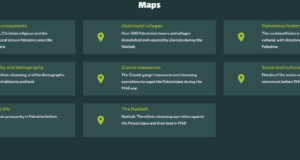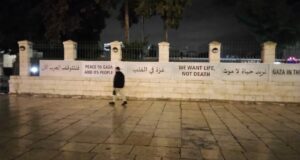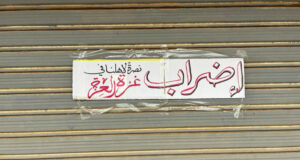Today saw the second in a series of non-violent demonstrations against Huwwara checkpoint, just south of the West Bank city of Nablus. Palestinians, joined by internationals, delivered a message to the Israeli army: We have had enough of the seven years of curfew that have been imposed on Nablus.
About forty protestors arrived at the checkpoint around 11.30am carrying signs saying ‘No Movement, No Life’ and ‘Stop the Occupation’. As the demonstrators approached the barrier the Israeli army fired live ammunition into the air to attempt to move the protestors back. One Human Rights Worker was detained, and was later released after the demonstration had ended, at approximately 12.30pm.
Nablus is surrounded by a system of checkpoints controlling all movement out of the city. The checkpoints are routinely closed, and when open the queues can be incredibly long. Even during winter, or the peak of summer, people can be stranded in the elements for hours. Many people have even died at the checkpoints as a result of delays in receiving medical attention. The most recent case was Taysir Mahmoud Ibrahim Qaysi, a cancer patient who was in a car without a permit, and was not allowed through Huwwara checkpoint. He died while waiting for car with a permit to get to him.
The lack of free movement of people and goods has had a devastating effect on the local economy. Unemployment rose 45% from 1999 to 2006 and continues to rise sharply, especially in the refugee camps within Nablus.
This isolation is not unique to Nablus, but is found throughout the West Bank. The system of closures, Israeli only roads and the wall serve to split the West Bank into isolated enclaves. Traveling between the enclaves can be difficult or impossible. There are 561 closures in the West Bank, only 14 of these fall on the green line. Security cannot justify 547 closures within Palestinian territory. As with Nablus, the closures have had a massive impact on the Palestinian economy as people find it increasingly difficult to get to work: unemployment is now well above 40%. The closures collectively punish 2.5 million ordinary Palestinians for the actions of a few combatants, and serve no extra security function.
 International Solidarity Movement Nonviolence. Justice. Freedom.
International Solidarity Movement Nonviolence. Justice. Freedom.


